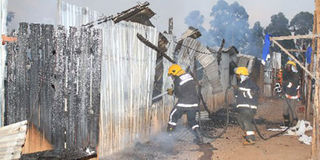No simple solution to global, school crisis

Firefighters from the Kisii county government try to extinguish a fire at Kerongorori Mixed Secondary School in Borabu on August 3, 2016. PHOTO | BENSON MOMANYI | NATION MEDIA GROUP
What you need to know:
The starting point everywhere is to acknowledge that there is a crisis.
How we respond to that crisis will determine our future and our values.
People who believe in cohesion, democracy and inclusiveness will definitely face challenges.
But as none of us have a monopoly on the truth or goodness, addressing the global or school crisis together is the only option.
- There are no simple solutions or remedies.
The challenge of writing a weekly column is not just about addressing a relevant or interesting topic; it’s above all having something insightful and informed to say on the matter. For over a month, I have desperately struggled to comprehend the unrest that has led to the burning of 120 schools all over the republic. I have analysed all the so-called motivating factors but cannot fathom why students would put their future to ashes and incur further financial burdens on their beleaguered parents.
Something is horribly wrong but we are not acknowledging it. How dismaying to hear political and civil leaders dismiss the seriousness of the matter by claiming that only one per cent of schools have been burnt. How many must be destroyed before we raise the alarm? It sounds like the same response of the PEV in 2008, when the same folk asked what was the big fuss as a mere 1,133 were killed and the 650,000 displaced had been resettled by a compassionate government.
SIMPLISTIC SOLUTION
When the problem is not denied, it is addressed with a simplistic, fast solution, much like googling an answer. Simple solutions seem to be the order of the day not just in Kenya. When Britain faced the difficult issues of immigration, European bureaucracy and challenging economic times, it allowed its citizens to vote to leave the European Union. Brexit became the quick fix to all its problems and now it would appear that new unanticipated challenges are mounting.
Turkish President Recep Erdogan reacted to an attempted coup by turning to terror tactics and repression. Seventy thousand citizens have been targeted with 18,000 of them detained. The latter group includes everyone from soccer referees to journalists, teachers and musicians. The repression is so extensive that one could be forgiven for believing that the "coup" was staged, a grand hoax designed to wipe out any opposition.
Turkey has now become a divided society as has America with the arrival of Donald Trump on the presidential platform. He again offers simple, attractive populism as the solution to addressing the challenges of living in a multi-ethnic, multi-religious, multi-cultural society. With the ISIS network spreading around the world, we live in dangerous, difficult times.
Democratic voices calling for reason, dialogue and complex responses to this crisis are being dismissed and detained all over the world. Citizens are demanding instant "Google" solutions to all their problems so we are more likely to see populist demagogues than inclusive democrats elected to office. Are we headed to a new order or a new disorder? Something is happening globally and no one is shining a light at the end of the tunnel.
But the starting point everywhere is to acknowledge that there is a crisis. How we respond to that crisis will determine our future and our values. People who believe in cohesion, democracy and inclusiveness will definitely face challenges. But as none of us have a monopoly on the truth or goodness, addressing the global or school crisis together is the only option. There are no simple solutions or remedies and toil, soul-searching and humility alone will bring us to the truth and reveal a way forward.
[email protected]; @GabrielDolan1





